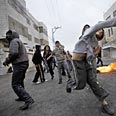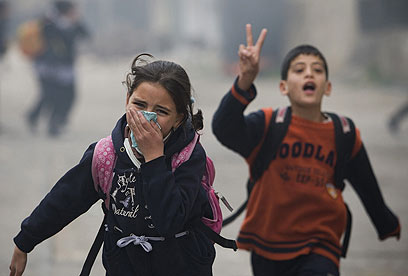
Escalation in Hebron clashes feared
Security forces prepare for possible escalation following Friday prayers, in wake of Jerusalem's heritage list decision. Palestinian PM Fayyad to visit Hebron in afternoon hours. Muslims also marking Prophet Muhammad's birthday, 16th anniversary of Goldstein massacre
Palestinian protests in Hebron in the wake of Israel's decision to include the Cave of the Patriarchs and Rachel's Tomb in its heritage sites list may get out of control Friday, Palestinian Authority officials warned Thursday night. Palestinian Prime Minister Salam Fayyad is expected to arrive in the city on Friday afternoon.
After four days of riots and clashes in the West Bank city, a more intense confrontation is expected to take place following Friday's Muslim prayers.
The Palestinian organizations declared a day of popular protest across the territories, particularly in Bethlehem and Hebron. The Muslims are also marking the Prophet Muhammad's birthday and the 16th anniversary of the Baruch Goldstein massacre at the Cave of the Patriarchs, which left 29 Palestinians killed. The combination of events may lead to an escalation, but PA officials stressed that the struggle would be popular and non-violent.
As tensions rise, security forces are also preparing for growing violence. The Jerusalem Police will be boosting their deployment around Temple Mount and Rachel's Tomb ahead of the holiday of Purim. A full closure has been imposed on Judea and Samaria for the duration of the holiday.
However, Israeli officials estimate that the Palestinian Authority will attempt to keep the protests under control.

Palestinian children in Hebron, Thursday (Photo: AP)
Meanwhile, a senior Fatah figure in Hebron accused Israel of attempting to ruin all the efforts to resume the diplomatic process.
In a conversation with Ynet, Palestinian Parliamentarian Abu-Ali Yatta said that designating the Cave of the Patriarchs as a heritage site is an Israeli attempt to divert attention from domestic problems and the pressure exerted on Jerusalem to renew peace talks.
"It's typical for the Israelis, every time the need to renew negotiations is brought up, to produce a crisis in order to divert the pressure and attention," he said. ""One time it's the Iranian nuclear program, another time it's the question of these sites, and all of it is aimed at buying time and evading international pressure to resolve the conflict through the establishment of a Palestinian state."
Hanan Greenberg and Efrat Weiss contributed to the story










